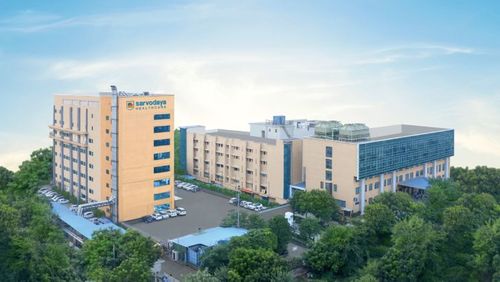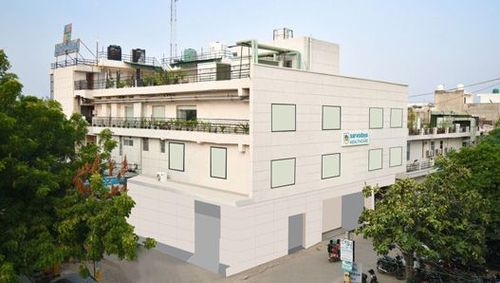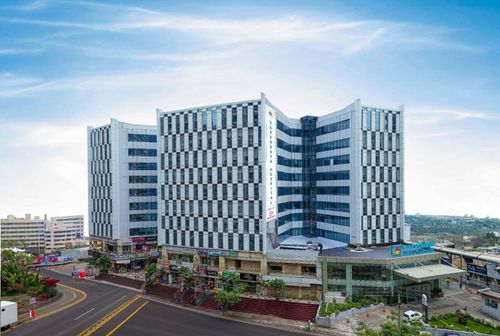Overview
Chronic kidney disease (CKD) causes a gradual loss of kidney function over many years. Early stages often have no symptoms, but can lead to high blood pressure and fluid retention. While kidney damage from CKD is typically irreversible, effective treatments can manage symptoms, reduce complications, and slow disease progression.
At Sarvodaya, expert nephrologist in Delhi NCR provide comprehensive chronic kidney disease treatment at all stages, combining medications, lifestyle modifications, and renal replacement therapies. We deliver education, support, and personalised care to help patients manage their condition and maintain quality of life.
Symptoms of Chronic Kidney Disease (CKD)
- Foamy urine
- Changes in urination frequency
- Itchy or dry skin
- Fatigue
- Nausea
- Loss of appetite
- Unintentional weight loss
- Swelling in arms, legs, or ankles
- Muscle cramps
- Shortness of breath
- Vomiting
- Sleep problems
- Ammonia-like breath odour
Causes of Chronic Kidney Disease (CKD)
- Metabolic and lifestyle factors
- Genetic and medical conditions
- Toxins and exposures
- Age, sex, and co‑morbidities
Diagnosis of Chronic Kidney Disease (CKD)
Accurate diagnosis of CKD determines the cause, stage, and kidney function, guiding safe and effective treatment planning while enabling ongoing monitoring by an experienced nephrologist in Faridabad.
- Blood tests – Assess kidney function using eGFR, creatinine, and a comprehensive metabolic panel to evaluate overall kidney health.
- Urine tests – Check for protein (uACR), blood, and microscopic abnormalities to detect kidney damage.
- Imaging – Ultrasound or CT scans evaluate kidney structure, size, and any obstructive issues.
- Kidney biopsy (when required) – Helps identify specific causes of CKD and guide precise treatment strategies.
- Regular monitoring – Tracks disease progression and effectiveness of ongoing therapies to prevent complications.
Treatment and Management of Chronic Kidney Disease (CKD)
- Early-stage management – Control diabetes and high blood pressure, adopt lifestyle modifications, and use kidney-protective medications like ACE inhibitors or ARBs to slow disease progression.
- Renal replacement therapy preparation – For advanced CKD, plan for appropriate long-term treatment options to maintain kidney function and quality of life.
- Haemodialysis – Blood is filtered through an external dialysis machine, typically three times weekly at a Best CKD Hospital in Delhi NCR.
- Peritoneal dialysis – Uses the abdominal lining to filter blood, performed at home for suitable patients.
- Kidney transplantation – The most effective treatment for end-stage CKD, requiring lifelong immunosuppressive therapy.
- Supportive care – Manage complications such as anaemia, bone disease, and cardiovascular risks while providing ongoing monitoring and patient education.
Prevention & Lifestyle Modification
At Sarvodaya Hospital, we guide you at every step, empowering you with the right habits to prevent kidney disease, protect your kidneys, and maintain lifelong renal health.
- Maintain healthy blood pressure and blood sugar – Controlling hypertension and diabetes through regular monitoring, medications, and lifestyle changes reduces the risk of kidney damage.
- Stay active and maintain a healthy weight – Regular exercise and balanced nutrition support kidney function, improve metabolism, and reduce strain on the kidneys.
- Follow a kidney-friendly diet – Limit salt, processed foods, and excess animal protein. Include fruits, vegetables, and whole grains to provide essential nutrients while protecting kidney health.
- Stay hydrated safely – Drink adequate water to prevent dehydration, but follow your doctor’s guidance if fluid restrictions are necessary due to kidney issues.
- Avoid nephrotoxic substances – Limit use of NSAIDs, certain painkillers, and harmful chemicals. Avoid smoking and excessive alcohol to reduce kidney stress.
- Regular check-ups and screenings – If you have risk factors like diabetes, high blood pressure, or family history, schedule regular evaluations at a trusted Chronic Kidney Disease Hospital in Delhi NCR for early detection and timely intervention.
Pre and Post Treatment Care
Before dialysis or transplant
- Comprehensive evaluation including cardiovascular assessment, infection screening, and psychological support
- Education about treatment options, lifestyle modifications, and what to expect
- Advance care planning and discussion of goals and preferences
- Preparation of vascular access for haemodialysis or peritoneal catheter placement.
Post treatment
- Regular monitoring of kidney function, electrolytes, and treatment effectiveness
- Management of complications, including anaemia, bone disease, and cardiovascular issues
- Dietary counselling and medication adjustments based on kidney function
- Psychological support and education for patients and families about living with CKD.









